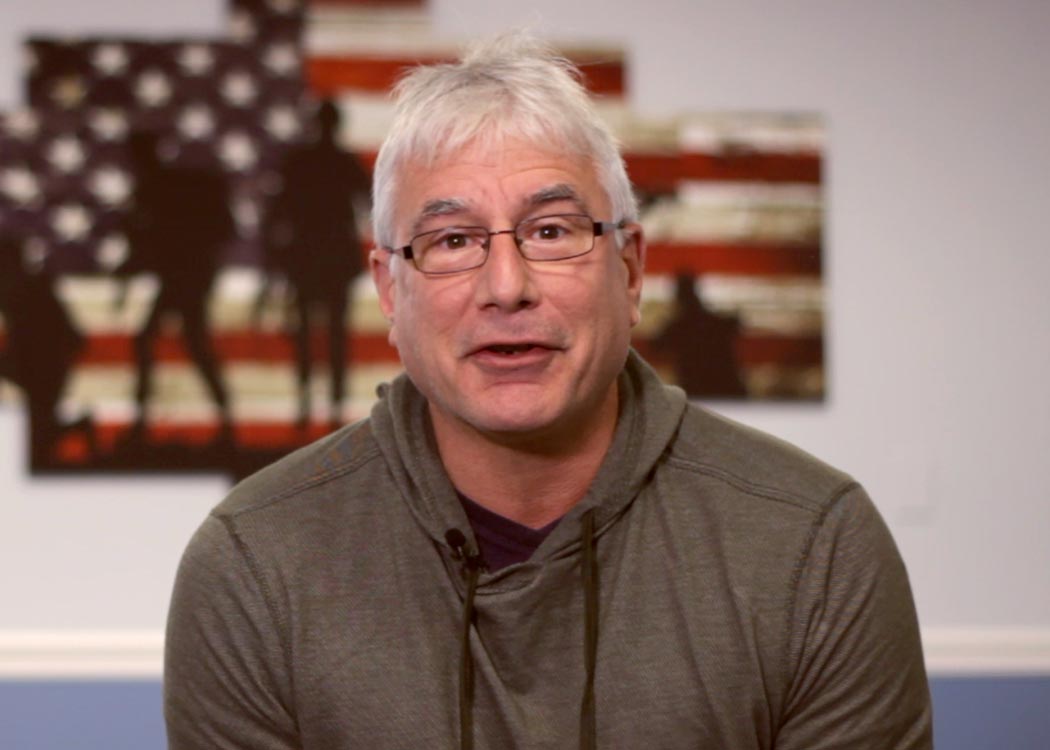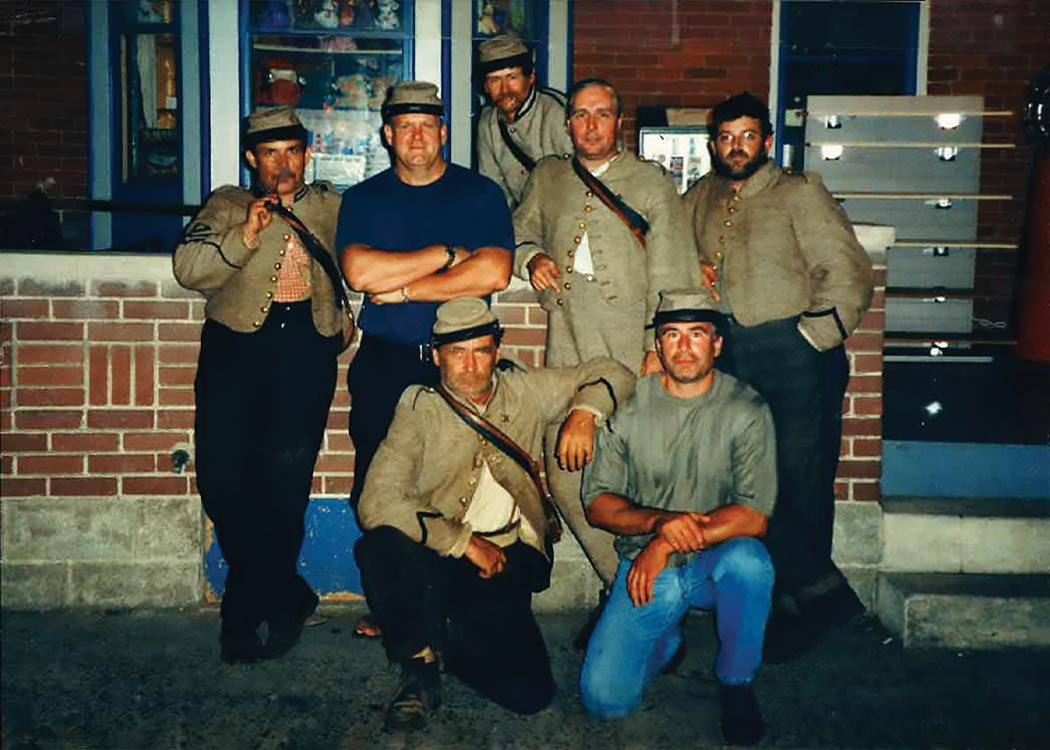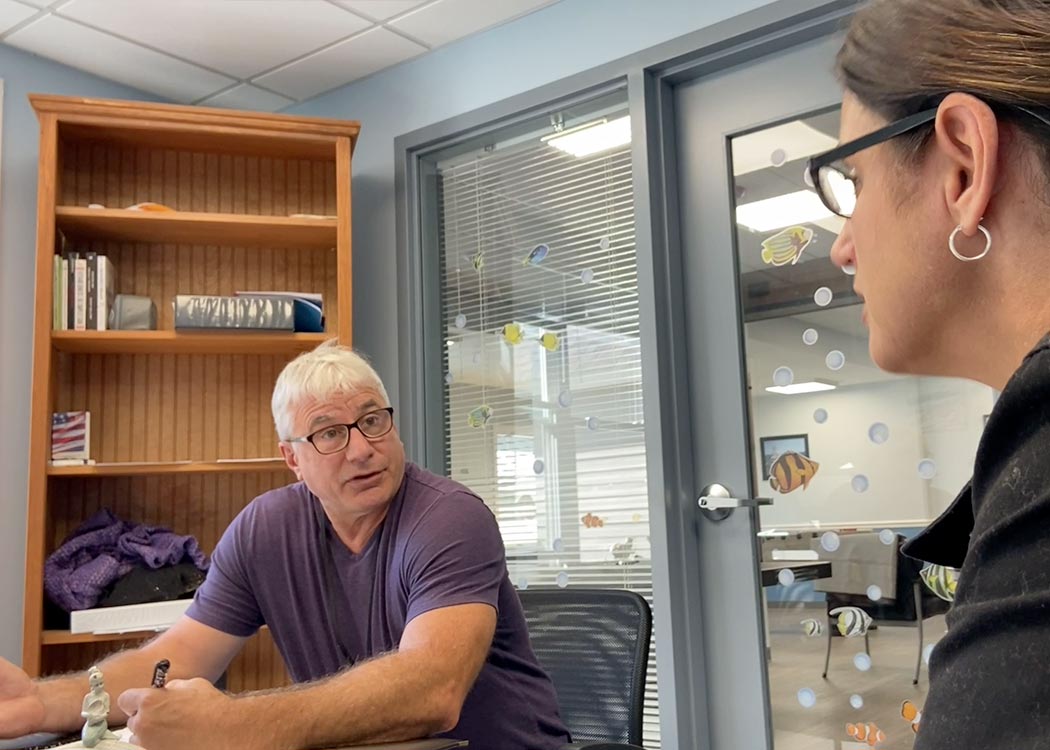
The Spring sun glares into the room on a recent Tuesday afternoon. Doug Grant sits down at the table, pulls out his reading glasses and digs into his latest historical fiction book. It was his moment of peace after a long, hard day at work.
Doug is wise in years, as evidenced by his white hair. But he’s even wiser in his experiences and perspectives – a long career in manufacturing, including the production of prosthetics for veterans, gears for the Mars Rover, and even hardware that sits on the International Space Station.
But he’s certainly not one to put his professional successes on a pedestal. Rather, his main message is a powerful reminder: even those who have accomplished so much can have their personal struggles.
This includes Doug, who is now nearly a year into his stay at Liberty House, the Catholic Charities NH program that provides substance-free housing for veterans facing homelessness and other significant barriers in their lives.
Doug takes a break from reading and looks around the room, reflecting. Although he never envisioned he would be sitting here, he’s grateful for Liberty House, grateful for this moment in time, and grateful for how donor support is helping him get his life back on track.
Choosing His Path in Life
Doug’s story begins in Dorchester, Mass., Boston’s most diverse neighborhood, where growing up in the ‘60s and ‘70s could give you a crash course in the harsh realities of life. During his freshman year of high school, courts mandated that the city’s schools be desegregated through busing, a crisis that pitted neighbor against neighbor and sent ripples through the city, state and nation. Many of his own friends, African-American students, were harassed, insulted and even attacked by protestors. Doug vividly recalls bricks being thrown at his school bus on multiple occasions.
Like many kids in “The Dot,” Doug faced constant exposure to “run with the bad crowds.” But Doug refused to get caught up in that lifestyle.
While many of his childhood friends spent nights in jail at the nearby District C-11 Boston Police Department station, Doug was spending hours immersed in books, a passion that started when he was part of a special SRA reading program in school. His favorites included the Old Testament and everything related to world history, American military history and world military history. It was a passion that led him to ultimately travel to dozens of Civil War battle sites such as Gettysburg, Penn., Fredericksburg, Va.; Appomattox, Va.; Vicksburg, Miss; Antietam, Md.; naming only a few (Today, many of his friends even jokingly called him “General Grant” because of love for history).

A man full of wonder and intrigue, Doug also had a passion for machining metals. After graduating high school, he moved out of his house, got his own apartment, and became a machine shop apprentice before spending a few years as a machinist. One of his childhood best friends, Jim, was also in the business, and they often talked about having their own company. At the age of 25, Doug now married with two children, took out a $1,800 loan with Jim, bought some machine shop equipment and started together in a cellar space in Brockton, Mass. As that was getting off the ground, he worked various part-time jobs to help make ends meet for his family.
After a few years, Jim and Doug were approached by an investor in precision gear manufacturing. That’s when things really took off. They soon took on contracts for military and aerospace applications, including work related to the Hubble Space Telescope and International Space Station applications. They made gears for arm and leg prosthetics for veterans. As Doug shared, “While I didn’t go to college, this was my academia. My career was homegrown, thanks to the support of Jim and many childhood friends. I would never be still doing it today if it wasn’t for them.”
Despite these early successes, something was missing. Doug always dreamed of serving his country. The Army National Guard was a path many of his friends from Dorchester took. “We always watched too many John Wayne movies, so it was inevitable,” he jokes.
In 1983, he joined the National Guard and went on to Fort Benning in Georgia for infantry training, with a focus on anti-tank TOW missiles. After a 12-week boot camp and a four-week advanced infantry anti-tank training, he was stationed to his training battalion in Braintree, MA. While balancing work, helping to raise a family and of course still maintaining a passion for history, he was honorably discharged after six years in the Guard.
“It Can Happen to Anyone, Even the Most Successful People”
Though Doug regularly drank during his early adulthood, it didn’t stand in the way of his busy life or present any serious problems to himself or to those around him.
When he reached his mid-40s, however, his marriage had fallen apart and his kids moved out. The drinks became higher in frequency and volume. He received his first DWI, then another a few years later.
“While I was still functioning and supporting my family, it was clear something was different,” said Doug. “It got to a point where I would have a drink and not know how to shut it off. While I was technically sober a lot of the time, it was never a good sobriety. My brain was so saturated with alcohol that I was in a fog and I felt so distorted and out of place. And I certainly wasn’t happy with myself.”
His tipping point was an intervention from his children. He knew he needed to do something before things got worse. With the support of his children and now former wife, he attended his first 28-day rehab program in 2012 in Franklin, NH: it was a 12-step Alcoholics Anonymous program. He returned to Massachusetts to work, but as he began to understand, being an alcoholic is a cyclical journey. He would relapse, attend another program, relapse again, with the wheels spinning on and on.
He decided to return to the place he was most comfortable. “Sometimes you find a place you love because of the people you were are with, and for me, that was New Hampshire,” said Doug. “It was tough to leave behind my family, friends and the job I loved, but we all knew it was the best move for me.”
He enrolled in a sober living program in the Lakes Region and bounced around a few other places, but the cycle continued, going in and out of seven-day detox and emergency room visits. He was arrested twice. He knew enough was enough – and that meant more structure, a sense of community and purpose to be truly committed and successful with his recovery.
Doug first heard about Liberty House from a veteran while at a treatment center. Two days later, he had an interview with Ashley Kitchell, Liberty House’s operations manager.
“When Doug came in for his interview, he was in a full suit, with his resume and a briefcase filled with documentation,” recalls Kitchell. “That was certainly a first! I’ve never had someone so prepared. Doug’s personality shined through from the moment we met him. His sweet demeanor, caring nature and willingness to help those around him made him a great fit for our program, and that hasn’t changed a bit!”
Two days after his interview, Doug moved into Liberty House – and the next phase of his life.
Support Liberty House
Support veterans, like Doug, as they seek to take back control of their lives and build stability.
Liberty House: A Safe, Supportive Haven filled with Comradery
Founded in Manchester in 2004, Liberty House was acquired by Catholic Charities NH in 2019, which allowed the program to expand its services and ability to serve more veterans like Doug. In 2020, it moved into a 16,000-square-foot home in Manchester, which more than doubled its residential capacity. The building was also renovated to meet the needs of the program, including the creation of a Center for Veterans, a central location for recovery meetings, community gatherings, job skills seminars and other veteran resources across New Hampshire.
Doug felt the instant connection on day one. “They were so welcoming,” he recalls. “They said, ‘you’re going to be okay, we’ve got your back and we’re going to get you back on track so you can just live your life’. It brought me a feeling of comfort that I didn’t have before.”
Residents like Doug move through Liberty House’s unique 4-step program. This includes recovery support, mental and physical wellness, gaining meaningful employment and the ultimate transition to independence. Most of these veterans either lack or have limited veteran benefits and may often find difficulty accessing appropriate services elsewhere.
Like most veterans, Doug’s road to recovery is rarely linear. Despite feeling that sense of connection, there were also natural doubts and anxiety. Two of his three children were over an hour away. There was a point where he “felt like a man without a country.” Doug wondered whether Liberty House was the right fit.
One day, he escaped to alcohol once again. Given Liberty House’s strict zero-tolerance policy, it meant Doug could no longer stay there.
“I made an irrational choice, but the team at Liberty House really went to bat for me,” reflects Doug.
They connected him to another sober house, but Doug felt like he had lost his chance at Liberty House. What he soon realized was the door for him never closed.
“Relapse is a normal part of the recovery process,” said Jeff Nelson, executive director of Liberty House. “Nearly three-fourths of our residents will relapse in some capacity, whether it was the result of a bad day or a certain trigger. We’ve learned and seen over time how our ‘open door’ policy can be beneficial and natural for a veteran to reset things and progress to where they need to go.”
“They really rallied for me to get me back to a place where I could resume my Liberty House journey,” said Doug. “When I came back, they told me it was my last chance. Some may view it as an ultimatum, but for me, I took away their genuine level of care for you. They helped me realize that I have to live well for myself, my family and the other residents.”
When he moved back in, Doug vowed to himself that there were no more “thoughtless mistakes.” He regularly met with his case manager, Jen Barlow, setting goals to help in his recovery – exercising again, opening a savings account and finding a job.
“One of the things that stands out about Doug is his commitment to self-improvement and growth, and the importance of plasticity over resiliency,” said Barlow. “For him, resiliency is the ability to bounce back stronger from a setback, whereas plasticity goes beyond resiliency in that a person also has the ability to evaluate and modify his behavior based on past experience. In his time here at Liberty House, I have seen Doug embody this theory. Despite having a few setbacks, he continues to reflect and adjust his mindset and behaviors to move forward.”
“When I think back on it, I know every time I relapsed, I would always tell myself that I am resilient. But you end up doing the same thing over again, expecting different results. I wasn’t changing, but I knew I was a little closer to beginning to figure it out. Whether it’s a good day or challenging day, the residents and staff continually instill the realization that you are truly loved and part of this community. They help you learn to love yourself, which believe me, can be tough for someone who has gone through a lot, but they’ve really helped me grasp that concept.”
Doug also participates in group meetings, which are valuable because he knows veterans have a lot to learn from each other. “We are all experiencing our unique set of challenges and obstacles, and there’s the opportunity for us to come together to share those experiences. Sure, many veterans may not be inclined to share much, but once we get comfortable with each other, we open up and those shared experiences help with the healing process. Just by talking and being transparent is a blessing. One person starts it, and the next guy feels comfortable talking about things or opening up. It’s an incredible process.”
Building a healthier lifestyle is at the core of the Liberty House program requirements. Curfew is at 10 p.m., which keeps residents like Doug accountable and helps further promote positive sleep habits, which can be key for health and overall recovery. Liberty House provides daily meals, clothing allowances and other forms of support, such as transportation to job interviews or appointments, as well as connections to primary care physicians, dentists and other medical providers.
Residents are also required to go through financial literacy training so they can learn valuable ways to decrease debt, manage their money and work on a reasonable budget. When they gain employment, they put 50 percent of their income into savings so they can be on more solid financial footing when they move out into the world.
For Doug, this structure has instilled a new level of confidence. “I was fortunate to grow up with some structure and discipline in my life. But I also know how easy the throes of addiction can take that away quickly. This has been an opportunity for me to rebuild and maintain that discipline again and become more responsible.”

A Role Model
As his time at Liberty House winds down, Doug wants to pay it forward.
“Doug is a very humble, thoughtful and bright guy who has had his fair share of successes and downfalls in life,” said Nelson. “What I admire most is how he’s using those experiences and lessons to be a positive leader, and our residents really look up to him. He is dependable and they can always count on him, whether it’s getting guys to a meeting or helping them avoid making bad choices. He truly cares about others and is one most compassionate people I’ve met.”
“Doug is an excellent mentor, not just in recovery but in life in general,” said Jason, a fellow Liberty House veteran resident. “He has experience and wisdom and always extends his hand to help others without hesitation.”
Filled with Gratitude
Now 62 and sober for a year, Doug is back on the road to independence. He is currently on the third stage of Liberty House’s four-stage model. He’s stabilized his recovery and has meaningful work as a quality engineer in the Lakes Region.
And he’s still working with Barlow on his goals. Since he never went to college, he recently enrolled in a psychology class at Manchester Community College. In the back of his head, he feels this is the start of a greater journey, one that can lead to a career in case management – “maybe in a setting of veterans helping veterans.”
When asked about the impact Liberty House had on him, one word comes to mind – gratitude.
“There was a lot of pain and despair in my life, but Liberty House helped me recognize how far I’ve come and how hopeful I am,” said Doug. “I accept the past is the past. What matters most is where I am in the present. When I wake up and take my head off the pillow, I have everything I need and control my day by how I think about it. And that starts with gratitude – gratitude for the simple things in life, gratitude for how we are continually here for each other and treated as human beings, and gratitude to the donors who have created this opportunity to start over again.”
Doug, the history buff, likely never envisioned his own story would be written like this, but one thing is for sure: he is glad that Liberty House will always be a central part of his own history book.
“Liberty House is a launching ground to starting a new life and a new journey,” said Doug. “Not only are we safe here, but when we leave, we’ll have the confidence that we’ll be okay and be able to pass along the lessons and perspectives we learned along the way. I envision that the veteran that replaces me when I leave, will also receive the incredible gift that I have gained by being here.”
Support Liberty House
Support veterans, like Doug, as they seek to take back control of their lives and build stability.